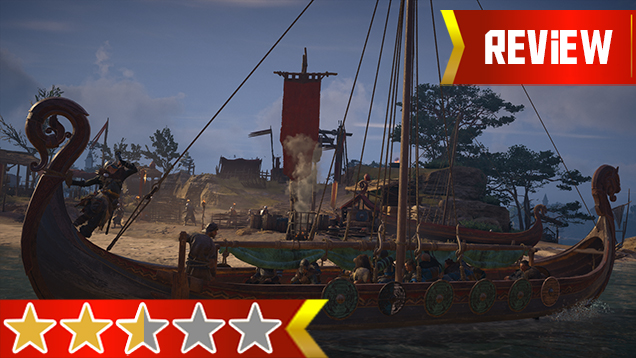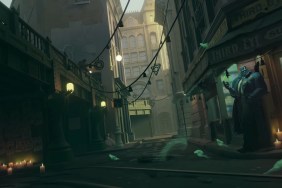ASSASSIN’S CREED VALHALLA REVIEW FOR PS4, XBOX ONE, PC, PS5, AND XBOX SERIES X.
Assassin’s Creed Origins was an origin in more ways than one as it went through the beginnings of the Brotherhood and marked a new start for the series as a whole. Odyssey expanded upon that refresh to a fault and now Assassin’s Creed Valhalla is the third iteration of this modern RPG formula. Vikings may be a promising starting point, but Valhalla is aimless and bloated beyond recognition, making for a dull and par for the Norse installment in the franchise.
The ups and downs of hilly England
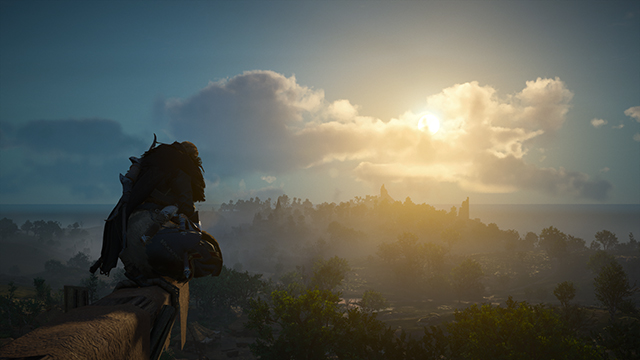
Ninth century Europe does have its bright spots though. England and Norway are lush in their own ways; the former full of trees and greenery and the latter covered in white frost. HDR does wonders for the game, especially as the sun washes over the landscape or sets in the distance. Brightly colored longships and longhouses also benefit from the same treatment, albeit in a different way as it brings attention to the lovingly created items from Norse culture.
Although beauty does not override how uninspired the actual world is. England may be visually appealing but forests and rolling hills grow stale rather quickly as they repeat over and over across the vast landmass. Many, many open-world games — including 2018’s Assassin’s Creed Odyssey — are filled with a similar type of terrain, plainly displaying how unoriginal and tired such open fields are. Valhalla’s fields are even more open and empty than usual, too, because of how few cities decorate its land and offer a chance of pace. The time period explains why this is an unfortunate reality, but that does not excuse it. Norway and Asgard are more unique but are unfortunately such small parts of the game.
A raven being led by the beak
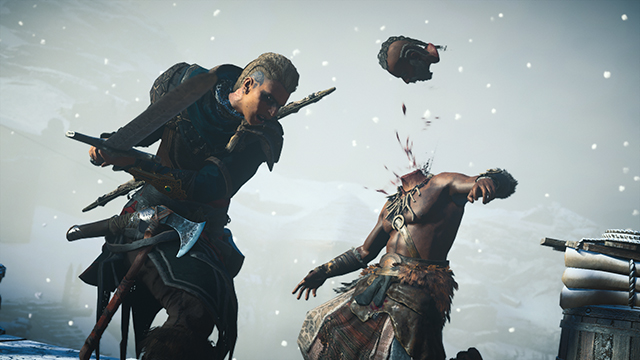
England does not earn its scale and only wastes the player’s time as they ride back and forth between missions that are similarly mind-numbing. Valhalla, even on its insultingly easy Pathfinder exploration difficulty, asks very little of the player. It leads them by the nose from objective to objective, offering little in the way of actual exploration and discovery. Players are almost never rewarded or encouraged to figure things out or experiment. Almost everything important is marked and incredibly straightforward, keeping the player’s brain a constant, near-vegetative state as they do what the game tells them.
Open-world games are slowly starting to embrace creativity and Valhalla’s overbearing grasp on the player and lack of tools is suffocating in comparison. More freeform goals with multiple acceptable paths and a rich, reactive world would be a thoughtful step forward in modernizing the series. Railroading players down one path and not leaving much room for freedom squanders its potential and makes the game feel like it was ripped out of an open-world design document from 2013. Valhalla doesn’t step into the current era and quickly grows stale because of it — a negative aspect that compounds when compared to its two recent and remarkably similar predecessors.
A rusty axe and blunt hidden blade
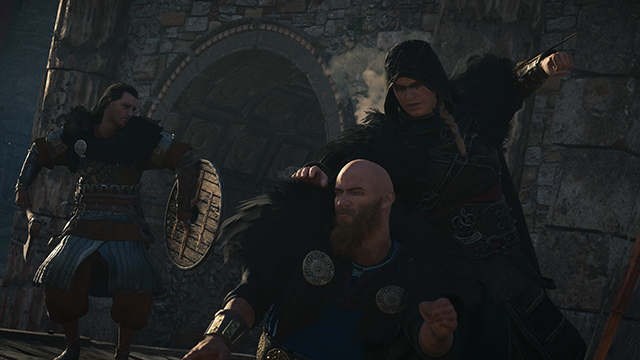
While Valhalla doesn’t venture into much new territory, it does at least combine the combat styles of both Origins and Odyssey, utilizing the defensive posture of the former while simultaneously holding the aggressive nature of the latter. Even with the needlessly obfuscated and obtuse skill tree it comes with, the mix of styles creates a solid balance as the stamina-dependent defensive side keeps it from being mashy while the ability wheel adds more options and some much-needed visual flair. Enemies come in multiple shapes and sizes and their varying strategies stave off repetition.
Repetition can set in if players find some exploitative killer strategy, which is all too simple. Some abilities and attacks can be linked together and looped in such a way that can repeatedly stagger the most intimidating Vikings and turn them into the shame of their clan. And when effective strategies like that are so easy to find and even easier to abuse, it weakens the entire combat system and all of the options it holds. Delving into the dual-wielding system or wealth of unlockable powers is a hard ask when two axes and the slam can kill nearly everything with ease.
Stealth doesn’t even have a bright side and is dramatically downplayed in Valhalla, a sad truth that is symbolized in how protagonist Eivor wields the iconic hidden blade: on their forearm for all to see. Options are too limited (even more so than Odyssey) and thus limit how you can play with the environment and the enemies. And as such, the basics of shooting arrows and waiting in waist-high bushes becomes the all-too-boring norm that has grown monotonous over the years. The new cloak sections attempt to bring back the social stealth from the first game, but they’re also overly restrictive and too slow. Vikings make for lousy assassins and that conceptually makes sense, but the gameplay shouldn’t suffer because of that incongruent comparison.
Bad AI puts a hamper on stealth in multiple, sometimes conflicting ways. Enemies bounce between being completely braindead to having the eyes of an eagle and the all-knowing perception of a god. They’ll detect you through walls and across a field with their back turned as often as they’ll fail to see their buddy drop dead right next to them. Friendly AI can be similarly stupid as allies can get hung up on simple tasks like helping you open up a chest or following you down a ladder.
Part of this may be due to the game’s shaky technical foundation. While patches are said to be coming, Valhalla is prone to crashing and the occasional glitch. Text can continually reappear, models could have trouble popping in, lips might not sync, and other polish-related issues can give the impression that the game isn’t as complete as it should be; something that is harder to justify given its borrowed foundation. Long loads are in a different category of technical shortcomings, but still drag the game down as it can take multiple minutes to load a save and dozens of seconds to load into a cutscene or vendor menu.
Demanding so much and giving so little
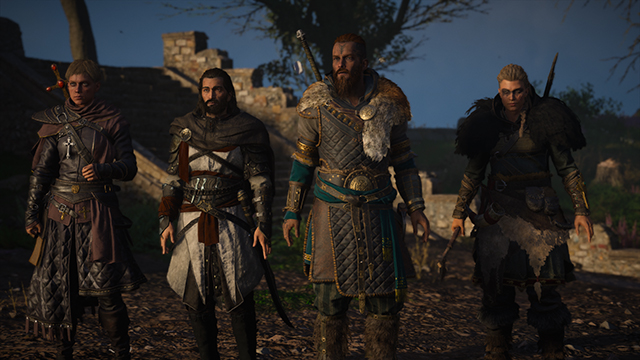
Valhalla already asks a lot of the player’s time as it is a ridiculously long game, dwarfing even Odyssey and its elongated hour-count. Length isn’t an inherently damning prospect, but it has to be earned and Valhalla does not come close to earning its 60 to 70 hours for a multitude of reasons.
A lot of its follies stem from its storytelling style that focuses on smaller, two-hour side stories over one overarching one. These side stories, or arcs, lack any sort of theme or message and only pantomime drama that it usually doesn’t bother setting up well. Solving an area’s drama yields that area’s trust and while the details change, the relatively low interest level hardly does as most characters, Eivor included, aren’t always the most memorable faces, despite the mostly well-written dialogue. It’s all clinical setup done in such a short amount of time.
Most of the arcs are forgettable in a vacuum but even more so once taken in the grand scheme of things as there barely is a grand scheme at all. Eivor heads to England seemingly on a whim to “pacify” the land, create a settlement, and buddy up with the local kingdoms. Racking up alliances has no endgame; it is the endgame. The best RPGs, like the best television shows, know how to make strong, individual narratives in each episode that also contribute to the bigger picture. Valhalla’s lack of a bigger picture further robs these already uninteresting chapters of the meaning since it all feels aimless without something gluing them all together — an issue that gets exponentially worse as the game drags on and on with more and more purposeless side plots.
But even Eivor’s loose main goal is troublesome because of how the game glosses over the inherent issues that come with violent expansion. Moving into a new land and killing the natives to grab their property deserves justification or some examination, something the game couldn’t be less interested in doing. Having control over what kind of Viking Eivor is would not only inject some woefully-needed player agency in the narrative, but it would also offer fertile grounds for such commentary. Having to deal with your consequences of your bloodthirsty reign or non-violent methods seems made for an RPG like this.
The villages that Eivor and their crew burns down and picks clean are seemingly filled with poor, innocent people that likely don’t deserve such a fate. Eivor is the villain and, in many cases, reasonably so. Even the British soldiers aren’t properly demonized enough to explain away killing them on sight in their country. Such a premise is ripe for examination or critique, but the game just treats it as a fun mechanic that you shouldn’t think too hard about.
Assassin’s Creed Valhalla Review | The final verdict
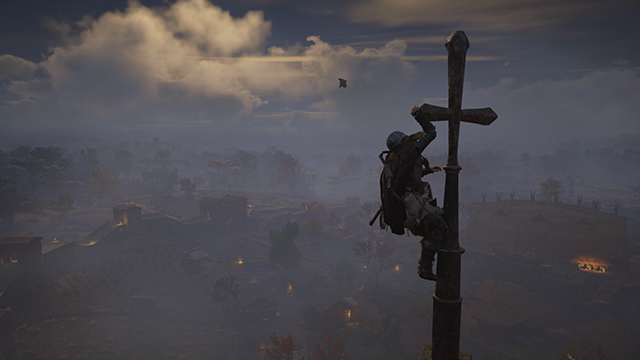
Assassin’s Creed Valhalla should serve as a learning experience like Assassin’s Creed Unity, the last installment that forced Ubisoft to rethink its approach. Valhalla’s unnecessarily inflated hour count, limited stealth mechanics, disconnected story, and overwhelming sense of familiarity all point to a series once again on the decline because of its inability to focus on its strengths. Obsessing over playtime and Content™ at the cost of innovation and depth puts Valhalla‘s ability to actually get into Valhalla in question, as it doesn’t quite earn the kind of glory that only the best Vikings achieve.
Game Revolution reviewed Assassin’s Creed Valhalla on PS4. Code provided by the publisher.
-
Beautiful green forests and ice-capped mountains.
-
Combat has many different enemy types and a lot of potential...
-
...But it can be easily exploited.
-
Stealth lacks options and is further harmed by bad AI.
-
Overarching narrative is basically nonexistent, robbing the individual arcs of their purpose.
-
Bloated world with far too many samey environments and objectives.
-
Prone to crashing, bugs, long loads, and other visual or technical oddities.
